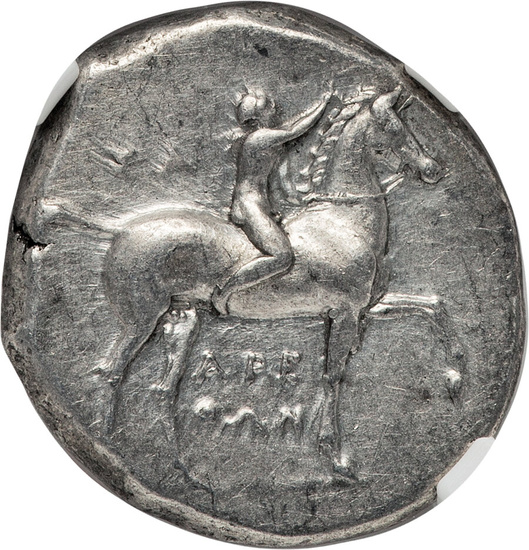Ancients: , CALABRIA. Tarentum. Ca. 302-280 BC. AR didrachm (21mm, 7.85 gm, 5h). NGC AU 5/5 - 4/5, Fine Style....
CALABRIA. Tarentum. Ca. 302-280 BC. AR didrachm (21mm, 7.85 gm, 5h). NGC AU 5/5 - 4/5, Fine Style. Arethon, Sa- and Cas-, magistrates. Nude youth on horseback right, crowning horse with right hand, reins in left; ΣΑ in upper left field, ΑΡΕ/ΘΩΝ below horse / ΤAPAΣ, Taras astride dolphin left, tripod in outstretched right hand; CAΣ below. HN Italy 957. Vlasto 666. Flashing surfaces burst with brilliant wintry light. Chiseled figures with a glossy luster. Taras, a figure of Greek mythology and the eponymous founder of Tarentum in Calabria, played a pivotal role in the art and culture of the region. Taras was believed to be the son of Poseidon, the Greek god of the sea, and a local nymph named Satyrion. According to mythology, Taras was saved by his father Poseidon when he was thrown into the sea by his mother, who feared his divine nature. He was carried to the shores of southern Italy, where he founded the city of Tarentum. Depicted as a youthful and handsome figure riding a dolphin, Taras symbolized the city's maritime significance and its unique blend of Greek and local influences. His imagery, prevalent in coinage, sculptures, and other artistic representations, served as a source of civic pride and a testament to Tarentum's rich heritage. Taras' influence extended beyond Calabria. The city of Tarentum itself became known for its wealth and cultural achievements, including its distinctive red-figure pottery. The figure of Taras and his association with the sea continued to be influential in the art and culture of the region for centuries. HID10510052018 © 2024 Heritage Auctions | All Rights Reserved
[ translate ]Bid on this lot
CALABRIA. Tarentum. Ca. 302-280 BC. AR didrachm (21mm, 7.85 gm, 5h). NGC AU 5/5 - 4/5, Fine Style. Arethon, Sa- and Cas-, magistrates. Nude youth on horseback right, crowning horse with right hand, reins in left; ΣΑ in upper left field, ΑΡΕ/ΘΩΝ below horse / ΤAPAΣ, Taras astride dolphin left, tripod in outstretched right hand; CAΣ below. HN Italy 957. Vlasto 666. Flashing surfaces burst with brilliant wintry light. Chiseled figures with a glossy luster. Taras, a figure of Greek mythology and the eponymous founder of Tarentum in Calabria, played a pivotal role in the art and culture of the region. Taras was believed to be the son of Poseidon, the Greek god of the sea, and a local nymph named Satyrion. According to mythology, Taras was saved by his father Poseidon when he was thrown into the sea by his mother, who feared his divine nature. He was carried to the shores of southern Italy, where he founded the city of Tarentum. Depicted as a youthful and handsome figure riding a dolphin, Taras symbolized the city's maritime significance and its unique blend of Greek and local influences. His imagery, prevalent in coinage, sculptures, and other artistic representations, served as a source of civic pride and a testament to Tarentum's rich heritage. Taras' influence extended beyond Calabria. The city of Tarentum itself became known for its wealth and cultural achievements, including its distinctive red-figure pottery. The figure of Taras and his association with the sea continued to be influential in the art and culture of the region for centuries. HID10510052018 © 2024 Heritage Auctions | All Rights Reserved
[ translate ]


